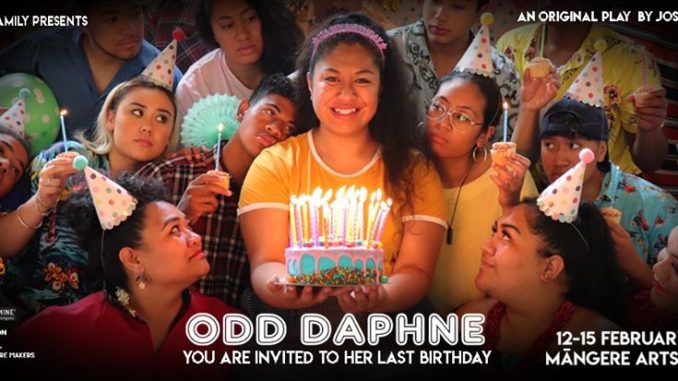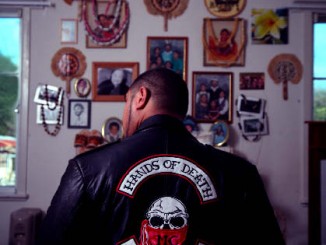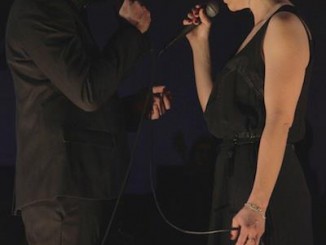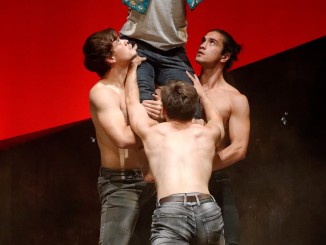
[Dysfunctional Families Meet Cheesecake]
Odd Daphne, a semi-autobiographical play by Joshua Iosefo, invites us on a journey to explore the bonds that tie families together, as well as how understanding can morph into drastic reactions – especially when large families try to intervene to resolve challenges faced by younger generations. Grief, trauma and self-acceptance are explored in the context of coming out, with Iosefa delivering an action-packed show to give audiences insight into widely-stereotyped Pasifika communities.
Having missed the initial run of what is acclaimed as ‘2019’s Most Original Production’ at the Auckland Theatre Awards, I am looking forward to the show. Pink is the colour of choice for this production, and a cake shop counter is visible as the audience settles into their seats.
Odd Family seeks to explore Whānau Theatre by creating a safe space for sharing and healing around mental health traumas through this play. As we’re introduced to the bond between our narrator-protagonist Damien (Ma’aola Ioane) and his sister Daphne (Talia-Rae Mavaega), I see the unique style of telling stories safely play out amid an atmosphere both joyful and playful. This is cleverly designed to challenge retrenched cultures of blame, vengefulness and acrimony that are often enmeshed in the everyday lives of any family. I feel a warm sense of belonging being welcomed into this odd family and extended Samoan-Nuiean whānau, with an extra helping of cheesecake, the little thing that represents a love language between Daphne and Damien.
Dysfunctional families are all distinctive in their own ways, but this one navigates the journey from self-expression to finding acceptance while nestled in the comfort of our families’ love with vigour, wit and the odd aside about the importance of friendship. The narrative structure follows the story of one half of the sibling duo, calling the meaning of the word ‘odd’ into question by laying out a plot based on Daphne wanting to end her life. I am struck by the ease with which the audience relates to the discussion of love languages whenever Daphne’s parents are onstage, meeting each line of dialogue with appreciative ‘hmm’ sounds. This sparks a discussion about self expression and love languages within families between the parents onstage, seeking out a more robust familial understanding around the desires of a younger generation in distress.
Song and dance are pivotal components of this epic-scale production. A mix of K-pop, Pasifika tunes and original score by cast members form the core of the soundtrack to Odd Daphne. The music complements the plot well, and we are drawn into the intimate embrace of the story as it navigates the choppy waters of attraction, friendship, disappointment, betrayal and triumph. I relish every occasion that Daphne’s best friend Kathy (Emily Moffat) is onstage – her openness about sexuality as a human need is desperately needed in contemporary life in South Auckland and beyond. The lighting design adds multi-dimensionality to my gut response to the tightly-crafted choreography of transitions as the audience tries to keep pace with the twists in the plot as Daphne is faced with demonstrations of love in attempts to keep her alive.
Standout performances include Emily Moffat as Kathy, Daedae Tekoronga-Waka as Aunty Julie, Carmel-Maria Savaiinaea as Aunty Diana and Director Joshua Iosefo’s parents Sonny and Fetaui Iosefo playing themselves in the characters of ‘Dad’ and ‘Mum’. The ensemble cast are stellar at the beautifully-choreographed dance sequences, and it would be remiss to omit praise for Rashad Stanely and Gabby Westerlund’s stellar artistic design, as well as Jonjon Tolovae’s costume design. Mavaega’s moving interpretation of Daphne is solidly relatable, and it resonates with me. Dylan Thuraisingham’s portrayal of the homophobic rugby team captain is especially memorable among several strong roles in Odd Daphne. I marvel at the extraordinary feat of bringing a story to life with so much support from an enormous cast and crew.
I would have liked the themes of toxic masculinity and femmephobia to be explored in more depth in this production. It is a missed opportunity to overlook questions about body inclusivity among the young men in the cast, giving off the impression that only ‘ripped’ and sculpted male bodies are attractive among Damien’s peers.
Daphne’s character is not subjected to this uncritical embrace of mass-media-fuelled body image negativity, and neither are her friends and whānau. Encouraging diversity beyond sculpted male torsos would benefit the LGBTQIA+ community, particularly among less-than-visible brown communities. I would also have enjoyed a more nuanced discussion around the desire to self-harm, rather than the presentation of three major character’s visceral emotional reactions to suicide proposals.
Some sequences in Odd Daphne are subtle in their execution – the juxtaposition of the main character’s low moments with an ensemble performance of physical mental well-being exercises to process grief, anxiety and stress are instructive in nature and likely to be replicated among younger audiences. Other sequences feel a little overextended at times to accommodate the size of the ensemble.
The audience departs the venue with many provocations around these subjects, but are left holding the impetus to reach out to several mental health resources to initiate discussions about our reflections. This is, more often than not, the most difficult aspect of coping with mental distress – reaching out for help, realistically captured by Ioane’s gut-wrenching performance as Damien. Odd Daphne succeeds at creating a powerful call for reflection and introspection about mental well-being in a more hyperstressed and anxiety-prone world.
The show is a crucial watch for Pasifika young people looking for representation of their own lives in the world of art. It is Auckland’s shame that more shows with near-complete Person-of-Colour casts and crews do not feature in more theatres across the city, rendering almost half of our population invisible to the privileged who attend theatre regularly. I would be curious to see where the plot of a sequel to this show leads (perhaps even an ‘Odd Trilogy’). The makers of this show are to be congratulated on pulling together a family-focused contemporary show that gently calls into question issues affecting everyday youth.




Leave a Reply